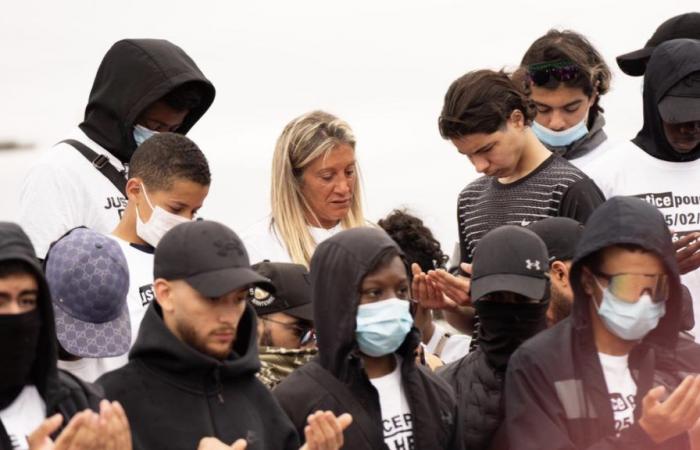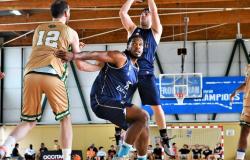On the Esplanade Charles de Gaulle in Nanterre, there were no crowds at the time of the meeting scheduled for 2 p.m. We will have to wait for the arrival of the first young people on motorcycles for training to take shape. On the handlebars of one of the two-wheelers, a white t-shirt with the inscription in black “Justice for Nahel 02/25/2006-06/27/2023”. On another, a black t-shirt with the same message in white letters.
At the head of the procession, Nahel’s relatives led the march of nearly a thousand people to Nelson Mandela Square, where the 17-year-old was killed by a police officer in June 2023. The scene filmed by residents had undermined the police’s initial version and had provoked urban revolts.
When Nahel’s mother, Mounia Merzouk, talks about “police violence against our children”she talks about ” manhunt “. In a poignant speech, she explains that she has “fed up with our children being hit and assaulted”.
It’s very hard for me to know that the two policemen are outside, it tears me apart
« The pain I have inside me is unbearable. It’s very hard for me to know that the two police officers are outside, it tears me apart ” she says. Her features soften as she begins to describe the kind and helpful nature of the one they nicknamed “Neh-Neh because he didn’t know how to say no.” A prayer followed then a minute of silence. The rest of Nahel’s family is there too. His aunt, in a wheelchair, takes the microphone and tells the “denial” and the “stomach ache” that she has felt every day for a year now. The grandmother, in tears, can barely get a few words out.
A feeling of injustice and a climate of fear in Nanterre
A year later, the feeling of injustice remains in Nanterre. A banner “crime pays” also recalls the jackpot of 1.6 million euros opened in favor of the police officer who killed Nahel. Who was released under judicial supervision after four months of pre-trial detention.
The jackpot story is drama added to drama
« The investigation is progressing and we are rather confident about its outcome. Our position has not changed, we maintain that the shooting was totally unjustified,” says Maître Nabil Boudi, the lawyer of Nahel’s mother. If we had to summarize the case in one question: did Nahel deserve to die at that moment? The answer is no. And the story of the jackpot is drama added to drama,” comments the lawyer.
Before reaching the park where a barbecue is organized, red and green smoke bombs are lit. Then the march resumes with slogans such as “Justice for Nahel”, “No justice, no peace” or “Police everywhere, justice nowhere.” One by one, the names of the other victims of police violence are listed: Adama, Yanis, Wanys, Ibrahim, etc.
One day later, nothing has changed
Names that resonate with Nahel’s friends who live in a climate of fear. “Some time after Nahel, there was a young man from Aubervilliers who died. Nothing has changed, justice has not yet been done,” laments Soso, 18, who grew up with the teenager. Posed on his motorcycle which pays homage to his ” brother “he came to support Mounia.
Frankly, when we see the police, we are afraid
Soso describes the daily life that he and many young people experience in the neighborhoods of Nanterre. After Nahel’s death, we were all afraid of the police. We didn’t know what could happen to us. Even today, we’re careful when we go out. There are good and bad police officers. But in Nanterre, most of them are pretty mean to the young people in the neighborhoods.”
An opinion shared by Adam, close to Nahel: “As soon as I leave my house, I’m afraid of dying. The police control us directly, it’s always aggressive, they insult us as dirty Arabs or they slap us. » Next to him, his friend Ali chimed in with a mixture of sadness and anger. “It got worse. The police, they come, they break our phones, they beat us. We are not safe. Honestly, when we see the police, we are afraid. We run away sometimes.”
The solution in mobilization
Soraya knows this atmosphere of permanent fear well. As the mother of one of Nahel’s classmates, she considered him as her son. He was a neighborhood kid, a kid from a recreation center, they grew up together. For me, it’s not fair what happened. A life is not a game. You can’t take a life because there’s a hit and run. A life is much more valuable than that,” she laments.
With a look that is both discouraged and determined, she elaborates. There is prison, there is police custody, there are many punishments that can be handed down for delinquency, since supposedly, he was a delinquent. Which surprises me, because delinquency, for me, is more in the police than in the street,” she explains, while calling for no confusion about the police.
Accustomed to demonstrations, Soraya denounces the violence of the BRAV-M and calls for the removal of the law on refusal to comply which “kill our youth”. Before 2017, police officers could only use their weapons in self-defense, if they felt their lives were in danger. But under the mandate of François Hollande, this legal framework was relaxed to give the police the possibility of using their weapon when the driver was likely to endanger the lives of others in his escape.
The persistence of police homicides
According to the latest reports from the IGPN, the number of deaths following police intervention is increasing. In 2022, 22 people died after police shootings. Among them, 13 were targeted following a refusal to comply. In comparison, there were two victims in 2020 and one in 2021.
You have to take out your cell phone, you have to film, it can dissuade the police
With time and this feeling that nothing is changing, families affected in one way or another by police violence have learned to no longer rely on institutions. Soraya advises not to turn a blind eye to the sight of identity checks. “You have to take out your cell phone, you have to film, you have to be present from start to finish, that could dissuade the police.”she recommends.
Like her, Saphia, activist at La riposte antiraciste, calls for unity and coming together. She helped co-organize the march with Nahel’s mother. “One of the worst things that can happen to us is that Nahel’s memory falls into oblivion and that he becomes a kind of news item, whereas what happened”she analyzes.
“I would like to remind our brothers and sisters in working-class neighborhoods that their lives matter and that they have the right to express themselves, to take up space and to campaign.” From the latest mobilizations against pension reform, against police violence in the neighborhoods or even for Palestine, Saphia remembers that “social combativeness remains”. She hopes that the protest will be able to continue to be expressed over time despite the increasingly strong repression of these movements.
Lilia Aoudia






